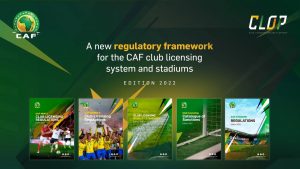 CAF Executive committee adopted on 10 December 2020 a new regulatory framework for CAF club licensing system and stadiums. However, due to the impact of the covid-19 pandemic at the time, the roll out of the new regulations was postponed and finally came into force on 1 July 2022.
CAF Executive committee adopted on 10 December 2020 a new regulatory framework for CAF club licensing system and stadiums. However, due to the impact of the covid-19 pandemic at the time, the roll out of the new regulations was postponed and finally came into force on 1 July 2022.
The Confederation of African Football has worked and approved important updates on the CAF Club Licensing System and Stadiums framework. The new regulations are the first major reform of CAF’s club licensing system and stadiums since being first introduced in 2012, which include:
1. A new edition of the CAF Men’s Club Licensing Regulations
2. The first edition of the CAF Women’s Club Licensing Regulations
3. A new CAF Club Licensing Quality Standard
4. A dedicated CAF Club Licensing catalogue of sanctions
5. A new CAF Stadium regulations
The new CAF regulatory framework strengthens the club licensing system for men’s and women’s football for continental and domestic competitions, defines the minimum requirements that Member Associations or affiliated leagues as Licensors must comply with in order to operate the Club Licensing System, establishes a categorization of stadium technical requirements per type of CAF competition, and sets out the sanctions to be applied for lack of proper implementation of club licensing system by the national associations.
CAF Men’s Club Licensing Regulations (edition 2022)
Regarding the new edition of the CAF Men’s Club Licensing Regulations, below a summary of the changes:
1. CAF Men’s Club Licensing Regulations (edition 2022) makes it mandatory for all member associations to license their clubs aiming to participate in the CAF Interclubs Competitions, as well as at a minimum, their clubs participating in the domestic men’s top tier competition.
2. CAF has moved away from the A, B and C types of criteria. Under the CAF Men’s Club Licensing Regulations (edition 2022), two types of criteria are introduced: Continental Criteria and Domestic Criteria. Continental Criteria apply to clubs participating in CAF Interclubs Competitions. The Domestic Criteria must be defined by each Member Association for their men’s top tier domestic competition respecting the minimum criteria and requirements established in the CAF regulations. The Licensors must now include as a criterion, at a minimum in their top tier men’s national club competition, articles 26, 28, 30, 31, 32, 33, 34, 35, 39, 40, 41, 42, 47, 48, 53, 54, 55, 58, 59, 60, 61, 62 and 63 from the CAF Men’s Club Licensing regulations into their National Men’s Club Licensing regulations, while adjusting the requirements in each criteria to the domestic competition regulations.
3. Improvements have been made to the Club Licensing criteria for various topics, including but not limited to, child protection and welfare, medical care of players, women’s football teams, club administrative positions and qualifications, and tighter deadlines for overdue payables.
4. Specifically on the sporting criteria in the CAF Men’s Club Licensing Regulations (edition 2022), CAF has now introduced a requirement for women’s football teams, which means that clubs intending to participate in the CAF Interclubs competitions must have at minimum one (01) women’s first team participating in a competition sanctioned by the member association. To comply with this requirement, clubs may operate the women’s team(s) itself or have a written agreement with another entity who operates the team(s).
5. The new regulations also indicate that the Club Licensing process for CAF Interclubs as well as (at a minimum), the domestic men’s top tier competition must now be completed through the CAF Club Licensing Online Platform (CLOP).
CAF Men’s Club Licensing Regulations (edition 2022) [PDF]
CAF Women’s Club Licensing Regulations (edition 2022)
The inaugural CAF Women’s Club Licensing Regulations (edition 2022) follow the same spirit of the Men’s Regulations in regard to the core process, decision-making bodies and processes. However, the primary difference is that women’s clubs will need to meet specific criteria, different from the men’s, to obtain a licence and be able to participate in the CAF Women’s Champions League.
It is particularly important to mention that the criteria are simple and realistic for the clubs to meet since the CAF Women’s Club Licensing Regulations will be applied to the women’s football clubs participating in both the Qualifiers and the Final phase of the CAF Women’s Champions League.
CAF Women’s Club Licensing Regulations (edition 2022) [PDF]
CAF Club Licensing Quality Standard (edition 2022)
The CAF Club Licensing quality standard (edition 2022) aims to further promote professional management and continual improvement in the running of the club licensing system and the club monitoring process. To ensure the credibility of the system, the licensor must correctly apply the core processes, the set deadlines, the catalogue of sanctions and the consequences of a licence refusal, while guaranteeing the principles of independence, confidentiality, and equal treatment of all licence applicants/licensees.
Ultimately, the CAF Club Licensing Quality Standard aims to further promote professional management and continual improvement in the running of the club licensing system with a greater focus being placed on the actual core processes of the club licensing system of each Member Association.
The CAF Club Licensing Quality Standard defines the minimum requirements that Member Associations or affiliated leagues (i.e. the “Licensors”) must comply with in order to operate the Club Licensing System.
The club licensing quality standard will assist the Member Association in the correct implementation of the basic club licensing processes and procedures within the licensing system of each Member Association.
CAF Club Licensing Quality Standard (edition 2022) [PDF]
CAF Club Licensing catalogue of sanctions (edition 2022)
The implementation of the Club Licensing procedure must be respected by all CAF Member Associations. The CAF Club Licensing regulations stipulates that CAF shall implement a catalogue of sanctions and carry out spot-checks with the Licensors (Member Associations or affiliated Leagues) in order to ensure that the licenses are properly awarded.
CAF Club Licensing Catalogue of Sanctions (edition 2022) [PDF]
CAF Stadium regulations (edition 2022)
In order to harmonize and unify the structures underlying professional football, CAF, through these regulations, establishes the requirements that all stadiums where matches are held under its aegis must comply with. The purpose of these regulations is to define the technical requirements to be met by stadiums for use in football competitions under the auspices of CAF, with a view to providing the best conditions for football practice, safety, functionality and comfort for player, fans and officials.
The regulation governs the minimum structural criteria to be fulfilled by a stadium for it to be classified (in ascending rank order) as CAF category 1, 2, 3 or 4. The higher the category is, the stricter and more numerous the criteria. The structural criteria applicable to specific categories are presented in the form of tables showing the criteria gradation between the different categories.
CAF Stadium Regulations(edition 2022) [PDF]
Category 1
- Women’s Youth FIFA competitions – Qualifiers
- Women’s Champions League – Qualifiers
Category 2
- Women’s Africa Cup of Nations (WAFCON) – Qualifiers
- Men’s u17/u20/u23 Africa Cup of Nations (AFCON) – Qualifiers
- Men’s u17/u20/u23 Africa Cup of Nations (AFCON) – Final Tournaments
- Men’s Champions League – Preliminary Round
- Men’s Confederation Cup – Preliminary Round
Category 3
- Men’s Champions League – Group Stage and Quarter Finals
- Men’s Confederation Cup – Group Stage and Quarter Finals
- Men’s Africa Cup of Nations (AFCON) / FIFA World Cup – Qualifiers
- Men’s African Nations Championship (CHAN) – Qualifiers
- Women’s Africa Cup of Nations (WAFCON) – Final Tournament
- Women’s Champions League – Final stage
Category 4
- CAF Super Cup
- Men’s Africa Cup of Nations (AFCON) – Final Tournament
- Men’s African Nations Championship (CHAN) – Final Tournament
- Men’s Champions League – Semi Finals / Final
- Men’s Confederation Cup –Semi Finals / Final
- Other top tier competition defined by CAF
The above-mentioned regulations have now entered into force since July 1, 2022. The new CAF men’s club licensing regulations and CAF women’s club licensing regulations must be incorporated into every member association’s national club licensing regulations.
 Arunava about Football A look at football & the world through my eyes!
Arunava about Football A look at football & the world through my eyes!


